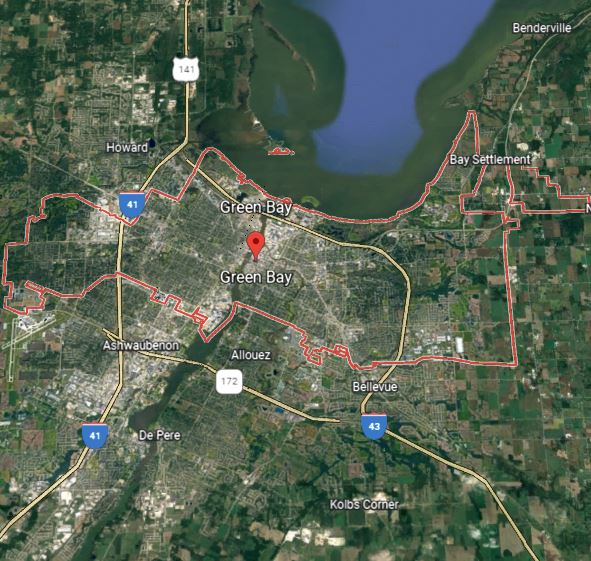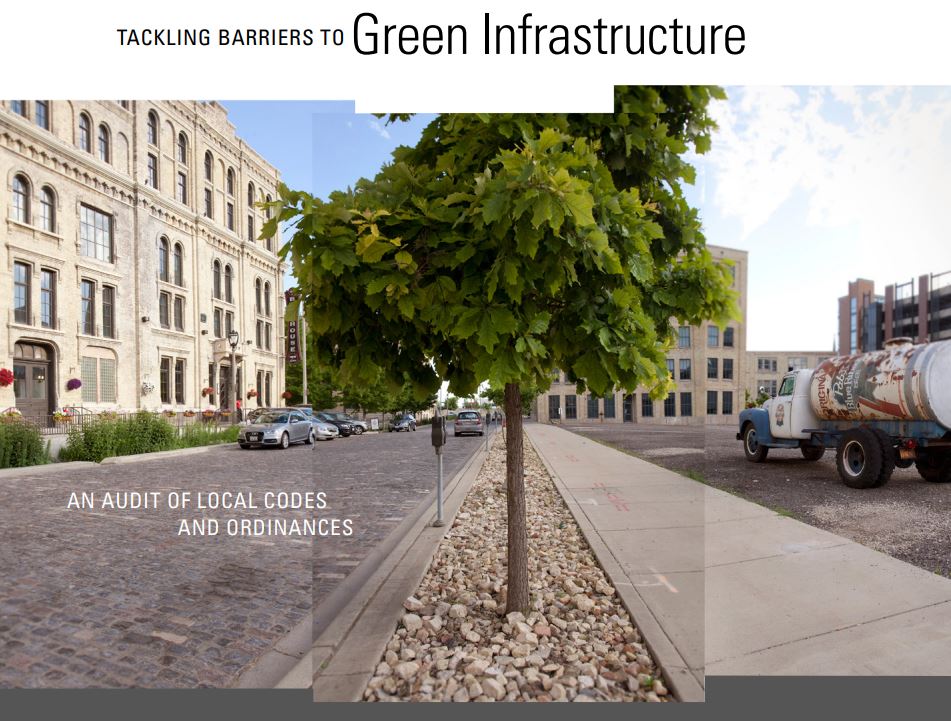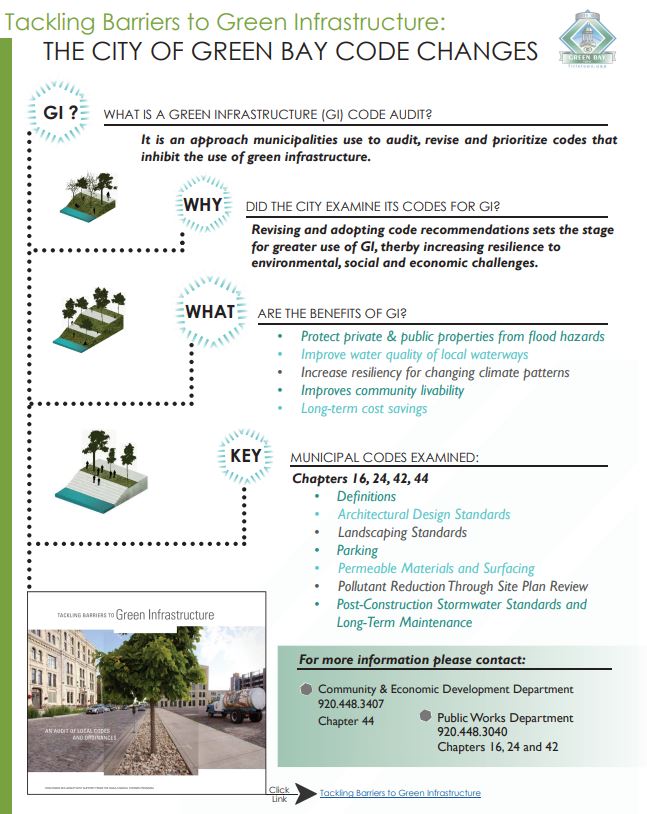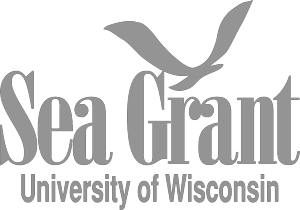
There was a need to audit the City of Green Bay’s municipal code to identify any barriers to green stormwater infrastructure.
Green Bay Green Stormwater Infrastructure Code Audit

City of Green Bay Wisconsin. Image from Google Earth.
Overview
Title of Project: Green Bay Green Stormwater Infrastructure Code Audit
Organization(s): City of Green Bay
Project Cost: $24,730
Grant Award(s): $15,000, Great Lakes Commission’s Great Lakes Green Infrastructure Champions
Collaborators:
- City of Green Bay
- Mayor’s Office
- Resiliency Coordinator
- Public Works Department
- Community & Economic Development Department
- Parks, Recreation, and Forestry Department
- Law Department
- Information Technology Department
- Finance Department
- Water Utility
- Sustainability Commission
- Wisconsin Sea Grant Institute
- Wisconsin Department of Natural Resources
The Coastal Resilience Issue
The City of Green Bay is positioned at the mouth of the Fox River and the bay of Green Bay, Lake Michigan’s largest freshwater estuary.
In March 2019, rainfall and significant snow melt over the frozen ground caused flooding along the East River. Nearly 150 people were rescued and a total of 36 homes were condemned because of the flood. In addition to riverine flooding like this event, the City has experienced coastal flooding due to storm surges and high lake levels. The City’s urban environment limits infiltration and increases stormwater runoff exacerbating flooding events and contributing to water quality issues.
Vision for the Community
The City of Green Bay wants to utilize long-term solutions such as green stormwater infrastructure to combat flooding, non-point source pollution, and extreme weather conditions as well as protect public and private property, provide cost savings, and build coastal resilience.
The Need
Green stormwater infrastructure can be discouraged and even prohibited by outdated or ambiguous municipal codes. There was a need to audit the City of Green Bay’s municipal code to identify any barriers to green stormwater infrastructure.
The Process
 The City of Green Bay followed the process outlined in Wisconsin Sea Grant’s workbook, Tackling Barriers to Green Infrastructure: An Audit of Local Codes and Ordinances.
The City of Green Bay followed the process outlined in Wisconsin Sea Grant’s workbook, Tackling Barriers to Green Infrastructure: An Audit of Local Codes and Ordinances.
The City was awarded a $15,000 Great Lakes Green Infrastructure Champions grant. These funds were used to hire an independent consultant to audit the City’s municipal code.
At the start of the project, Wisconsin Sea Grant and Wisconsin Department of Natural Resources led community scoping workshops for City staff. The purpose of these workshops was to (1) enhance the understanding about the role of green stormwater infrastructure in clean water, flood resilience, and other community benefits; (2) demonstrate how a code audit of can reveal opportunities and barriers for the use of green infrastructure; and (3) learn about the code audit process and complete a community scoping exercise. During the scoping exercise, city staff answered questions related to how they understand and value green infrastructure, barriers to implementation, and possible solutions.
- Tackling Barriers to Green Infrastructure: An Audit of Local Codes and Ordinances
- The Value of Green Infrastructure: A Guide to Recognizing Its Economic, Environmental and Social Benefits
Recommendations from an independent contractor and input from city staff were utilized to identify barriers and propose amendments in the municipal code to support the implementation of green stormwater infrastructure. Once recommendations were made, the process of amending the City’s municipal code was executed in four phases.
Phase 1: Distribute Results
The findings from the audit and feedback from the scoping workshops were presented internally to staff.
Phase 2: Gather and Incorporate Feedback
Drafts of the proposed code changes were produced and shared. Over the course of two years, feedback from city staff and the Sustainability Commission was gathered and incorporated into the draft code amendments.
Phase 3: Legal Review
Draft code amendments were sent to the law department for legal review as they were ready. After being reviewed by the law department, they were made available for public comment through stakeholder outreach and committee meetings.
Phase 4: Committee Review and Codification
In the final phase of this process, draft code amendments were put before committee for approval. Different codes are reviewed by different committees depending on the nature of the amendment. For example, changes to the stormwater ordinance went through the Improvement and Services Committee, whereas codes related to landscaping were sent to the Planning Commission. After they were approved by their respective committees, they were put before the city council to be codified.
What Has Been Accomplished So Far
The City of Green Bay’s municipal code went through a recodification during this project, during which time the green stormwater infrastructure code update process was temporarily paused.
Since the recodification, all six of the proposed code changes have been codified by the city council. The process for amending municipal codes can take multiple years. From “start to finish,” the City worked with their stakeholders for 34 months on this project.
The municipal code can be found here.
Partnerships
This project strengthened partnerships with the Mayor’s Office, Public Works Department, Community and Economic Development Department, Parks, Recreation, and Forestry Department, Law Department, Water Utility, and the Sustainability Commission.
Lessons Learned
- Be proactive and spend time educating elected officials, especially when new officials are elected
- Offer staff training across departments to help create internal buy-in
- Be consistent and persistent with outreach efforts through each phase of the project
- Base outreach on facts and data
- Provide many opportunities for feedback through each phase of the project
- Utilize the expertise of the city’s staff
- Word choice and phrasing are important, take the time to understand what terminology means to your stakeholders





